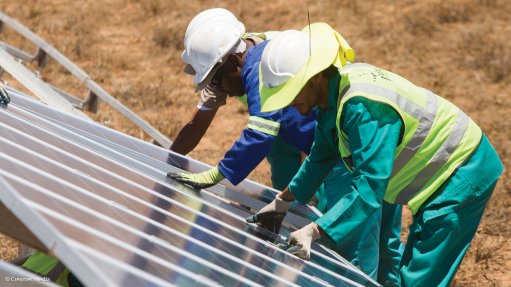The Reds are dead
By: Anton Eberhard
There are two key challenges facing the electricity distribution industry (EDI) in South Africa. They can be dealt with through pragmatic restructuring proposals, and the National Energy Regulator of South Africa, or Nersa, and the Department of Energy need to be held accountable for fixing the sector.
Everyone now agrees that the regional electricity distributors (Reds) are dead as attempts over the past 15 years to deal with capacity and other problems in the EDI by amalgamating the electricity distribution functions of local government and Eskom into six Reds have not been successful and have been abandoned. This was confirmed in a Cabinet decision in 2010.
It is important to be clear about this fact. Restructuring of the EDI has been discussed ever since the national electricity conference convened by the African National Congress at the University of Cape Town in 1993, but with little result. I can think of no other policy issue that has gone back to Cabinet as many times and with so little success. An energy policy White Paper was published, endless inter- departmental and stakeholder committees convened, international consultants hired, national summits called and, eventually, a dedicated entity, EDI Holdings, was tasked, between 2006 and 2010, with establishing the Reds. It spent R1.2-billion before being unwound.
But still we do not have Reds, and the reason is clear. The Constitution specifies that elec- tricity distribution is a local government function and even though many municipalities entered into voluntary agreements to proceed with restructuring, they demurred when faced with the prospect of giving up their most valuable assets and revenue streams.
Government responded through a proposed constitutional amendment that would transfer these functions to national government, but it soon withdrew the amendment when it became clear that it would not pass in the National Assembly.
There is a huge and growing skills and maintenance gap.
The second important reality in the current EDI follows from these unfortunate decades of policy uncertainty. Fearing they would lose their electricity businesses, municipalities stopped investing in related physical and human capital. They reduced maintenance and refurbishment of networks and let their apprenticeship and bursary schemes collapse. Senior, experienced engineers have either retired or are close to retirement. Today the maintenance backlog is estimated at R35-billion and is growing at around R2.5-billion a year. The average age of the existing network is approaching 50 years.
The consequence of this lack of investment in networks and people is not always publicly obvious. Unlike an Eskom power generation failure, which affects the entire country, a network failure is generally area specific. But, cumulatively, these network failures are becoming alarming. Most of the focus in recent years has been on Eskom, which has had to mobilise massive resources to build new power stations. But unless the power generated from these investments is trans- ferred successfully down transmission and distribution networks to consumers, blackouts will be endemic and economic and social costs will multiply.
Pragmatic Approach to Restructuring
The unsuccessful attempt to establish Reds demonstrates the risks and dangers of ambitious restructuring plans. We now need to take a more pragmatic route.
We need to recognise the status quo, whereby Eskom distributes about half the electricity in the country (mainly because of historical reasons when it took over the electricity networks in former homelands and also because of its involvement in the national electrification programme since the early 1990s). Eskom at least has an ongoing investment programme in maintenance, refurbishment and expansion of its networks. It makes no sense, at this stage, to transfer Eskom’s distribution business to municipalities that have generally performed worse.
At the same time, the constitutional rights and responsibilities of municipalities, which currently distribute the other half of South Africa’s electricity, need to be recognised.
Unfortunately, the Cabinet decision that abandoned the Reds model did not provide an alternative. The National Planning Com- mission has now proposed a pragmatic plan to fix the EDI.
The scale and complexity of the challenges facing the EDI might seem insurmountable. We could start by disaggregating the problem and applying the 80:20 principle – 80% of the problem could be fixed by 20% of the effort. It is a striking fact the 12 cities account for nearly 80% of electricity distributed by municipalities. Our efforts need to focus on these 12 cities that also account for the bulk of our gross domestic product. The assets and accounts of the electricity services of these cities need to be ringfenced and robust plans developed to elimi- nate maintenance and refurbishment backlogs and to sustain these practices into the future. EDI Holdings did much valuable work – these plans need to be resurrected before all institutional memory is lost. And, in the few anomalous situations where Eskom is still supplying some of the customers of these cities, consideration could be given to transferring these assets. Once these 12 cities have been fixed, support could be extended to other towns.
At the other end of the spectrum, there are more than 100 small municipalities, many in rural areas, which are struggling to provide a sustainable electricity service. Many are losing money and would voluntarily enter into service delivery agreements with either Eskom or neighbouring cities. Eskom has already been approached by a number of small municipalities but needs clear support from government to take over their electricity distribution functions. And Mangaung has shown the way through establishing a regional distributor, Centlec, to distribute electricity to neighbouring towns.
Holding Institutions Accountable for Implementation
Few would disagree with the above diagnosis of the challenges facing the EDI and the set of pragmatic proposals for fixing the challenges. Some may wish to highlight a number of additional challenges – for example, dis- parate tariffs– but by far the most important challenge is to provide the means and incentives for municipalities to invest adequately in electricity networks and in the people and skills to operate and maintain them. We need to implement these plans, first by ensuring ongoing yearly commitments to maintenance and, second, by eliminating the accumulated backlog.
The most obvious institution to assign responsibility for ensuring that municipal electricity distributors invest on an ongoing basis in maintenance is Nersa. The regulator has responsibility for protecting electricity consumers and, more than anything, con- sumers want a reliable electricity supply. The regulator has the powers to establish national norms and standards, including the ring- fencing of municipal electricity businesses and minimum maintenance levels. Nersa also approves yearly electricity tariff increases for municipalities. Part of its approval process involves assessing the costs of muni- cipal distributors (at least the larger ones), including maintenance budgets. Municipalities that fail to spend allocated budgets could in subsequent years face reve- nue clawbacks and lower tariff increases. There are sufficient revenues within the EDI to fund ongoing maintenance. Nersa (with the support of the Department of Cooperative Governance and Traditional Affairs and the National Treasury) needs to hold municipalities to account.
Special measures will be necessary to deal with the R35-billion maintenance backlog. There are various possibilities of funding this backlog, including loans, a levy on electricity transmission sales and fiscal grants. The easiest funding mechanism would be from the National Treasury through the Department of Energy’s Integrated National Electrification Programme, which already disburses billions of rands each year to muni- cipalities for new electricity connections. It has auditing, monitoring and disbursement systems in place, but these would need to be strengthened to handle a large national maintenance programme.
Parliament has been proactive in interro- gating stakeholders around the current failures in the EDI. It now has the opportunity to intensify its oversight function by holding both the Department of Energy and Nersa to account in ensuring that our electricity networks are adequately maintained and that electricity will continue to power economic growth and development.
Professor Anton Eberhard works at the University of Cape Town Graduate School of Business and is also a member of the National Planning Commission - anton.eberhard@gmail.com
Comments
Press Office
Announcements
What's On
Subscribe to improve your user experience...
Option 1 (equivalent of R125 a month):
Receive a weekly copy of Creamer Media's Engineering News & Mining Weekly magazine
(print copy for those in South Africa and e-magazine for those outside of South Africa)
Receive daily email newsletters
Access to full search results
Access archive of magazine back copies
Access to Projects in Progress
Access to ONE Research Report of your choice in PDF format
Option 2 (equivalent of R375 a month):
All benefits from Option 1
PLUS
Access to Creamer Media's Research Channel Africa for ALL Research Reports, in PDF format, on various industrial and mining sectors
including Electricity; Water; Energy Transition; Hydrogen; Roads, Rail and Ports; Coal; Gold; Platinum; Battery Metals; etc.
Already a subscriber?
Forgotten your password?
Receive weekly copy of Creamer Media's Engineering News & Mining Weekly magazine (print copy for those in South Africa and e-magazine for those outside of South Africa)
➕
Recieve daily email newsletters
➕
Access to full search results
➕
Access archive of magazine back copies
➕
Access to Projects in Progress
➕
Access to ONE Research Report of your choice in PDF format
RESEARCH CHANNEL AFRICA
R4500 (equivalent of R375 a month)
SUBSCRIBEAll benefits from Option 1
➕
Access to Creamer Media's Research Channel Africa for ALL Research Reports on various industrial and mining sectors, in PDF format, including on:
Electricity
➕
Water
➕
Energy Transition
➕
Hydrogen
➕
Roads, Rail and Ports
➕
Coal
➕
Gold
➕
Platinum
➕
Battery Metals
➕
etc.
Receive all benefits from Option 1 or Option 2 delivered to numerous people at your company
➕
Multiple User names and Passwords for simultaneous log-ins
➕
Intranet integration access to all in your organisation


















